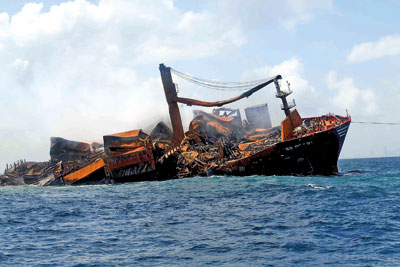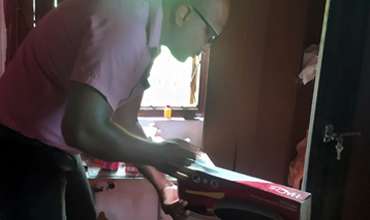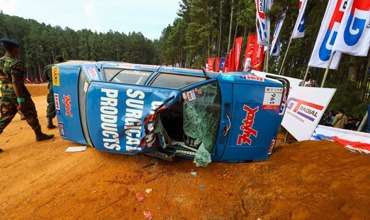Distressed ship’s agent says no emails were deleted
“The fire started after the ship was in achorage for 23 hours”X -PRESS FEEDERS are among the world’s largest feeder operators handling more than 600,000 containers per year through the Port of Colombo. Its local agent, Sea Consortium Lanka (Pvt.) Ltd., has been in the business for the past 30 years and is itself now in the eye of a storm following last fortnight’s fire and capsizing of one of its vessels X-Press Pearl off the Colombo Harbour. The following is a Question and Answer interview the Company spokesman had with the Sunday Times this week.
 ST: Why are the emails between the ship, yourselves and the Harbour Master supposedly erased from your computers.
ST: Why are the emails between the ship, yourselves and the Harbour Master supposedly erased from your computers.
SCL: At the very outset, we can categorically assure you that there has been no “erasure” of any e-mails by our company. This allegation has been made by various parties purely to insinuate that the company has deleted e-mails to destroy evidence of the chain of events prior to the arrival of the vessel X-Press Pearl into our waters. This is absolutely false and can be established by the computer records that have been handed over to the CID. I can therefore categorically assure you that all of the relevant emails are available.
ST: What do you mean by relevant emails?
SCL: We handle more than 30 vessels a month. Different staff members are given different vessels to handle. Every staffer gets a copy of all operational mails through a common domain address directly to their individual email address even though they do not handle that particular vessel. They are also copied to the Group id ops@x-pressfeeders.com.lk. Staffers who do not handle the vessel routinely delete the emails that are not applicable to their vessels to save capacity and for house-keeping management on their laptops. The Operations staffer handling X-Press Pearl has handed over the relevant emails to the CID. Nothing has been deleted from his, or the Group email id. All correspondence is therefore available completely intact. So, the allegations that have been made of deletions are based on the superficial examination that had been initially conducted by the authorities.
ST: When did the crew of the X-Press Pearl inform SCL regarding the nitric acid leak in one of the containers? Was it before or after the ship entered Sri Lankan waters?
SCL: The ship captain’s email to the agent was on the 19th May at 18.42 hours saying, “Smoke in container – no risk of fire”. The vessel was then in international waters.
ST: And what action did you, the agent take once informed – and when was that?
SCL: We informed the Port Authority’s Harbour Master by email the next day (20 May) at 10.19 hours. Our email read “Leaking of a container and smoke as well as requesting permission to discharge the container and rehandle this unit”.
ST: But the vessel entered Sri Lankan waters in the early hours of 20 May — before your email about the smoke. Who then asked for permission to enter Sri Lankan waters and who allowed the vessel to enter Sri Lankan waters?
SCL: First and foremost, there was no need for any special permission for the vessel to enter Sri Lankan waters since it was a regular caller to Port of Colombo. It was to be berthed at the CICT terminal as per berthing plan. It was in anchorage till it got a berth. In any event, even when the Port Authorities boarded the vessel after midday on the 20th after the receipt of our email and remained on the vessel for their inspection till around 18.00 on that day there was no fire on board. The fire occurred only at 11.10 pm.
ST: Did you and/or the vessel’s Captain alert the Harbour Master to the presence of easily inflammable Dangerous Cargo on board the vessel?
SCL: We did inform the authorities in Colombo that there was such cargo on board the vessel. This was at 16.45 on the 19th. The SLPA acknowledged receipt of this at 20.08 also before the vessel entered our waters.
ST: So, could they have discharged the leaking container between midday on the 20th and before it caught fire later that night? Wouldn’t that have avoided a fire breaking out on the ship?
SCL: Unfortunately, there was no alongside berth available at the time the vessel caught fire. The vessel had to wait until a CICT berth was free to berth and discharge cargo. Had a berth on arrival been available this could have been averted.
ST:Don’t vessels like this carrying consignments of Dangerous Cargo have sufficient firefighting equipment to douse a fire in mid-sea?
SCL: Yes, they do. However, this fire started while at Colombo anchorage after sitting there for almost 23 hours.
ST: Have you as a frontline shipper and/or the Shippers Association raised concerns over the inadequacy of firefighting equipment at the Colombo Port If so, from about when have these concerns been raised?
SCL: The Association of Ceylon Steamer Agents (CASA) which represents all agents of general cargo vessels, car carriers, tankers, bulk carriers, containers etc., has discussed these concerns. It would seem that in this instance, the Port Authority genuinely felt they could handle the fire. In fact, there have been much larger fires that have been very successfully dealt with in the past. However, in fairness to them this was an exceptional situation because there was extreme bad weather for four continuous days with high swell of the sea and gusty winds blowing at over 80 kmph. All these combined increased the fire to uncontrollable levels.
ST:Is your parent company willing to engage in providing compensation to the damage to the environment and livelihoods of the fishermen or do you feel it is the responsibility of the Government of Sri Lanka to sort out these issues?
SCL: We have linked the Sri Lankan State agencies here like MEPA, NARA, SLPA, Merchant Shipping and the Navy with the International Tanker Operators Federation which has worked in major disasters in New Zealand, Australia, North Sea, Baltics, Venezuela etc., to help in the process of assessing and quantifying the damage. There are established procedures to deal with such situations.
Related story
How the X-Press Pearl sailed into catastrophe
-
Still No Comments Posted.














Leave Comments